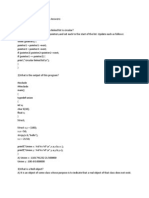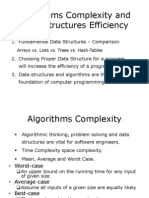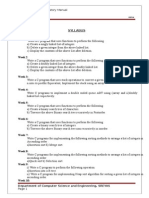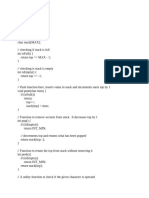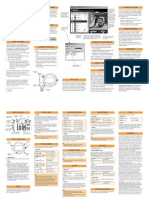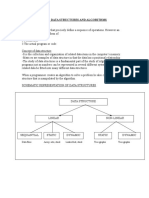C Program To Implement Infix To Postfix Expression Conversion Algorithm
Uploaded by
SaiyasodharanC Program To Implement Infix To Postfix Expression Conversion Algorithm
Uploaded by
SaiyasodharanC Program to implement Infix to Postfix Expression conversion algorithm
Program: #include<stdio.h> #include<stdlib.h> #include<string.h> struct node { char element; struct node *next; } *head; void push(char c); // function to push a node onto the stack char pop(); // function to pop the top node of stack int precedence(char c); // function to find the precedence of an operator void traceStack(); // function to //print the stack values int main() { int i = 0, j = 0; // indexes to keep track of current position for input output strings char *exp = (char *)malloc(sizeof(char)*100); char *res = (char *)malloc(sizeof(char)*100); char tmp; head = NULL; printf("Enter the infix expression: "); scanf("%s", exp); while( (tmp=exp[i++]) != '\0') { // repeat till the last null terminator // if the char is operand, copy it to output string if(tmp >= 97 && tmp <= 122) { res[j++] = tmp; continue; } if(tmp == '(' || tmp == '[' || tmp == '{') { push(tmp); continue; } if(tmp == ')' || tmp == ']' || tmp== '}') { char cl, tp; if(tmp == ')') cl = '('; if(tmp == '}') cl = '{'; if(tmp == ']') cl = '['; tp = pop(); while(tp != cl) {
res[j++] = tp; tp = pop(); } continue; } // if char is operator if(tmp == '+' || tmp == '-' || tmp == '*' || tmp == '/') { if(head == NULL) { push(tmp); } else { // if operator at top of stack has high precedence, pop it and // add to output string, else just push the operator while(precedence(tmp) <= precedence(head->element) && head->element != '(' && head->element != '[' && head->element != '{') { char tp = pop(); res[j++] = tp; if(head == NULL) break; } push(tmp); } } } // pop all the operators from stach to output string while (head != NULL) { res[j++] = pop(); }; res[j++] = '\0'; printf("Postfix expression is %s\n\n", res); return 0; } void push(char c) { if(head == NULL) { head = malloc(sizeof(struct node)); head->element = c; head->next = NULL; } else { struct node *tNode; tNode = malloc(sizeof(struct node)); tNode->element = c; tNode->next = head; head = tNode; } } char pop() { struct node *tNode;
tNode = head; head = head->next; return tNode->element; } int precedence(char c) { if (c == '*' || c == '/') return 2; else if (c == '+' || c == '-') return 1; else return 5; } void traceStack() { struct node *tNode; tNode = head; while(tNode != NULL) { printf("%c --> ", tNode->element); tNode = tNode->next; } printf("\n"); } Sample Output: Enter the infix expression: (a+b)*(d+e) Postfix expression is ab+de+* For more programs visit http://www.gethugames.in/blog
You might also like
- The C# Player's Guide - 5th Edition - 5.0.083% (18)The C# Player's Guide - 5th Edition - 5.0.0497 pages
- Introduction To Computer Theory by Cohen Solutions Manual80% (5)Introduction To Computer Theory by Cohen Solutions Manual198 pages
- Ap Computer Science Principles Practice Exam and Notes 202186% (7)Ap Computer Science Principles Practice Exam and Notes 2021108 pages
- Hacking The Art of Exploitation 2nd Edition Jon Erickson100% (20)Hacking The Art of Exploitation 2nd Edition Jon Erickson492 pages
- PrepTest 83 - Print and Take Test - 7sage Lsat100% (3)PrepTest 83 - Print and Take Test - 7sage Lsat46 pages
- Apache Cassandra Administrator Associate - Exam Practice TestsFrom EverandApache Cassandra Administrator Associate - Exam Practice TestsNo ratings yet
- UGRD-ITE6201-Data-Structures-and-Algorithms-legit-not-quizess MidALL100% (3)UGRD-ITE6201-Data-Structures-and-Algorithms-legit-not-quizess MidALL17 pages
- Easy C Programming Problems & Solution For BeginnersNo ratings yetEasy C Programming Problems & Solution For Beginners10 pages
- 74 - BD - Data Structures and Algorithms - Narasimha KarumanchiNo ratings yet74 - BD - Data Structures and Algorithms - Narasimha Karumanchi23 pages
- Data Structure Preliminaries, Array and Linked ListNo ratings yetData Structure Preliminaries, Array and Linked List9 pages
- DS Lab 11 - Binary Search Trees IterativeTraversalsNo ratings yetDS Lab 11 - Binary Search Trees IterativeTraversals9 pages
- Machine Learning: BE Sixth Semester 20CS610No ratings yetMachine Learning: BE Sixth Semester 20CS610211 pages
- Algorithms Complexity and Data Structures EfficiencyNo ratings yetAlgorithms Complexity and Data Structures Efficiency17 pages
- SB SoftSec16 03 Security Software EngineeringNo ratings yetSB SoftSec16 03 Security Software Engineering62 pages
- Lecture 4: Balanced Binary Search TreesNo ratings yetLecture 4: Balanced Binary Search Trees11 pages
- CRYPTOGRAPHY & NETWORK SECURITY (Autosaved)No ratings yetCRYPTOGRAPHY & NETWORK SECURITY (Autosaved)82 pages
- Public Key Cryptosystems With ApplicationsNo ratings yetPublic Key Cryptosystems With Applications21 pages
- Diffie-Hellman Key Exchange Man-in-the-Middle Attack Elgamal Cryptographic SystemNo ratings yetDiffie-Hellman Key Exchange Man-in-the-Middle Attack Elgamal Cryptographic System24 pages
- Advanced Encryption Standard (AES) (CS-452)100% (1)Advanced Encryption Standard (AES) (CS-452)59 pages
- C Program To Implement Evaluation of Postfix Expression Using Stack0% (1)C Program To Implement Evaluation of Postfix Expression Using Stack2 pages
- Scenario Based 3 (SIDHARTH K RA2011003010008)No ratings yetScenario Based 3 (SIDHARTH K RA2011003010008)6 pages
- C Program For List Implementation Using Array75% (8)C Program For List Implementation Using Array6 pages
- C Program To Convert Character To ASCII and To Find The Sum of Digits of ASCII ValueNo ratings yetC Program To Convert Character To ASCII and To Find The Sum of Digits of ASCII Value1 page
- Coding With JavaScript For Dummies Everything To Know About JavaScript (2020) - 40153100% (1)Coding With JavaScript For Dummies Everything To Know About JavaScript (2020) - 40153247 pages
- NWO, Illuminati, Freemason, Occult, Bible Prophecy, Conspiracy, Secret Society, Etc. LinksNo ratings yetNWO, Illuminati, Freemason, Occult, Bible Prophecy, Conspiracy, Secret Society, Etc. Links47 pages
- Structured and Unstructured Maintenance With Example0% (1)Structured and Unstructured Maintenance With Example9 pages
- Learn To Code HTML and CSS Develop Style Websites PDF100% (2)Learn To Code HTML and CSS Develop Style Websites PDF595 pages
- Python Programming For Beginners - A Crash Course To Learn Python and Other Recommended Coding83% (6)Python Programming For Beginners - A Crash Course To Learn Python and Other Recommended Coding86 pages
- LINUX COMMAND LINE An Introduction To Linux Command Line EnvironmentNo ratings yetLINUX COMMAND LINE An Introduction To Linux Command Line Environment174 pages
- How To Use PATS Module Initialization FunctionNo ratings yetHow To Use PATS Module Initialization Function5 pages
- Support Package - Stack Upgrade - SAP SPSNo ratings yetSupport Package - Stack Upgrade - SAP SPS14 pages
- Data Structures and Algorithms I Fall 2019 Programming Assignment #1No ratings yetData Structures and Algorithms I Fall 2019 Programming Assignment #17 pages
- Data Structures and Algorithms: (CS210/ESO207/ESO211)No ratings yetData Structures and Algorithms: (CS210/ESO207/ESO211)26 pages
- Assignment Advanced Data Structure and Algorithm: Group ANo ratings yetAssignment Advanced Data Structure and Algorithm: Group A20 pages


























